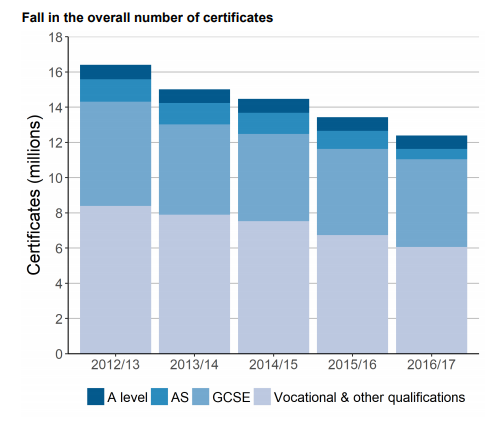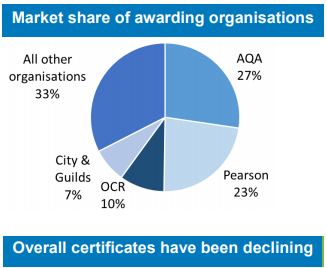The number of GCSEs awarded in England increased by two per cent last year, reversing a downward trend.
Ofqual statistics published this morning reveal that 4,983,980 GCSE certificates were handed out last year, up from 4,894,330 in 2015-16.
The number of GCSEs awarded had declined in recent years, from 5,917,050 in 2012-13, caused by a decrease in the number of secondary school-age pupils.

Ofqual puts last year’s rise down to the reaction of schools to changes to performance tables. GCSEs were the only type of qualification for which there was an increase in awards in 2016-17.
There was a particular increase in the number of English language and literature GCSE certificates, as level one and two certificates in these subjects were removed from school performance tables.
AQA continues to hold the largest market share for GCSEs. The exam board was responsible for 53 per cent of all certificates last year, up from 46 per cent in 2015-16.
Pearson holds 28 per cent of the GCSE marget, while OCR holds 13 per cent, and WJEC, the Welsh exam board, holds six per cent. All three saw their market shares decrease last year.
Maths remained the subject with the most certificates in 2016-17, though numbers reduced slightly from 2015-16.
The number of certificates awarded in GCSE science qualifications dropped in 2016-17. Ofqual said this is due to qualification reform, as those students who would have previously taken GCSE science at the end of year 10 and GCSE additional science at the end of year 11 will now be taking the new GCSE 9 to 1 in combined science, a double award available in 2018.
AS-levels collapse
The number of AS-level certificates awarded fell by a dramatic 43 per cent last year, from 1,026,210 in 2015-16 to 580,440 in 2016-17.
The decrease was expected; Ofqual’s summer 2017 GCSE and A-level entry figures from June last year showed AS-levels fell by 42 per cent, from 1,143,950 in 2016, to 660,200 in 2017.
The drop is down to the decoupling of AS-levels from A-levels. AS-levels now no longer count towards a final A-level grade, so there is less incentive for pupils to take them.
Schools Week has previously revealed how decoupling AS has caused huge problems for univeristies. The University of Cambridge, for example, said it was “forced” to reintroduce entry tests because it could no longer use AS scores to offer places.
The number of certificates for A-levels declined only slightly, by 2 per cent, from 775,480 in 2015-16 to 760,860 in 2016-17.
AQA had the largest market share for both AS and A-level certificates in 2016-17, though it dropped from 47 per cent to 43 per cent at AS.
In contrast, Pearson saw its share of AS certificates increase from 24 per cent in 2015-16 to 28 per cent in 2016-17. OCR’s share remained stable.
AQA’s share of A-level certificates increased by one percentage point in 2016-17, to 47 per cent, as did Pearson’s, which rose to 25 per cent, while OCR’s fell by two percentage points, to 22 per cent.







Your thoughts